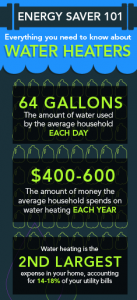Water heating is a large part of your utility bill, making up about 15% of the energy cost in a home. As such, choosing the right water heater is an important step toward energy efficiency. Because they should be replaced every 10-15 years, the decision you make now could end up saving (or costing) you a good amount of money in the long run.
 Traditional water heaters have a large, insulated storage tank where water is heated and held until it is needed. Tankless water heaters, as the name suggests, operate differently. This type of water heater uses a heating element (either gas or electric) to warm water only when it is being demanded. These systems can provide between 2 and 5 gallons of hot water per minute.
Traditional water heaters have a large, insulated storage tank where water is heated and held until it is needed. Tankless water heaters, as the name suggests, operate differently. This type of water heater uses a heating element (either gas or electric) to warm water only when it is being demanded. These systems can provide between 2 and 5 gallons of hot water per minute.
Tankless water heaters save electricity when compared to traditional units. This is because they do not have the same high levels of “standby” losses that are common with traditional units. After water is heated, if it is not used right away, it begins to cool and more energy must be used to reheat and keep it at the desired temperature.
Tankless heaters may not be the best option for everyone, however. If your home has a “hard” water supply, you may want to check with the manufacturer before choosing a tankless heater.
Solar water heating is another electricity saving option. Solar water heaters use the sun’s energy to heat water that is either in a storage tank or entering a tankless heating system. While they are not typically the primary system for a home, solar water heaters are an excellent compliment to other water systems.
A good way to compare the efficiency of different water heaters is to look at their Energy Factor (EF). The higher this number is, the more efficient the heater. The yellow and black EnergyGuide label is also a useful tool for comparing products based on their annual energy consumption and that of similar models. Finally, there are many Energy Star certified water heaters on the market. These heaters range in their efficiency from using anywhere between 14 to 55 percent less energy than those that meet the minimum federal requirements. Both tankless and traditional storage water heaters can earn this certification.
For more information on types of water heating systems and their energy efficiency, check out this fact sheet from University of Florida.
[Contributed by Heather Landis, UF Program Assistant]
Image source Department of Energy
 0
0
